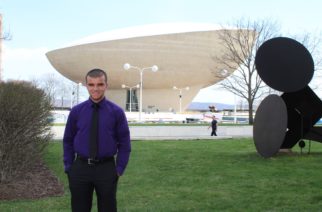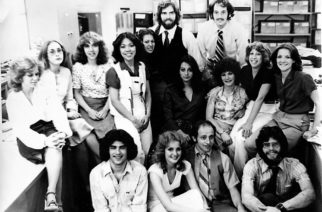
Glenn Doty, a former reporter and managing editor for the daily Middletown Times Herald Record and a respected SUNY New Paltz Journalism professor for many years, was the first news editor of the Legislative Gazette. Over the course of 23 years, Glenn taught his ever-changing groups of interns the basics of journalism, how to cover state government, and was a tough, fair and beloved presence in the LG newsroom. Here are some of his recollections of the Gazette, particularly in the beginning:
How did you come to take this position?
Understand, in my mind, I was recruited for only one semester to help start an internship.
While at the Record, I hired a young lady as a summer intern, which irked a corporate vice president who wanted his daughter to have the job. Several months later I was placed on paid leave, which meant I was sitting around with nothing to do. So I thought about finishing a bachelor’s degree, approached a New Paltz professor for guidance, and he recommended helping to start the Legislative Gazette.
Along the way, I was told I’d remain on leave for several more months, but the prospects for a return to the Record weren’t great. Ultimately, SUNY New Paltz offered me not one, but two, positions. I turned down the public relations job, although I did help out for several months. Instead, I agreed to go to Albany to help launch the Gazette, but my intent was to seek a position with another daily. Two things happened. I got a great bunch of students and Dr. Alan Chartock became a friend and adviser.
What was the first year of the Gazette like? Where were you located, and how did you manage to put out the first issue of a paper that has now been around, either in paper form or online, for four decades?
I don’t know which title he preferred, whether professor, doctor, or just plain Uncle Alan. But Alan (along with SUNY New Paltz Political Science Professor Dr. Gerald Benjamin) had an idea: starting a weekly internship newspaper that would cover state government. I don’t know all the bumps and bruises Alan suffered bringing his idea to fruition, but when I came on board during the early days of January 40 years ago, I watched as he wrestled with all sorts of folks from academia to the state university to government – and he succeeded.
Mind you, the Gazette’s first office, in a SUNY-owned building over on Lark Street, wasn’t a whole lot more than an oversized closet. But the very first interns were a pretty determined group who managed to find stories to write, and then managed to find a typewriter or two on which to write them. One of the interns, Donna Ciaccio, had a camera and produced a picture or two to go with the first issue that came out in February.
The students were terrific. Alan also enlisted his political science students to help, and they did. We accomplished a lot in that first year in a tiny room with one desk and several chairs, and our first issue was published on Feb. 21, 1978. Whew!
What was it like, over 23 years, having a new group of interns come in one after another who probably didn’t know much about reporting or state government? How did you guide them along?
We set up a list of legislative committees, students were assigned to cover them, and they learned, first hand, a lot about how state government was and wasn’t run. There was frustration when what appeared to be good legislation didn’t make it out of committee, and they learned a lot about legislators – good and not so good. And I was there to answer questions, as was Professor Chartock.
Early on, we were allowed to bring back an intern or two or three to help the new students. That helped a lot because students do like to ask fellow students the tough questions.
I will admit, however, that early on, I thought my job was to educate. As we moved through the years, I discovered that I was also priest, rabbi and minister, counselor, and parent in residence.
From that initial broom closet on Lark Street, the Legislative Gazette now has offices right on the Empire State Plaza Concourse. That must have been quite a journey over the years.
Alan obviously wasn’t thrilled with the facilities, and kept searching for new space, especially after the first semester of the Gazette was proclaimed a success. In the early years, the offices were housed in a number of places, including 260 Washington Avenue and then Draper Hall of the SUNY Albany downtown campus on Western Avenue.
In 1985, Alan hit a grand-slam homer: The Gazette moved to offices on the first floor of the Alfred E. Smith State Office Building. My gosh, the state Capitol was just across the street and so was the Legislative Office Building. Legislators could actually find us, and visited. Wow!
In addition to the move, the 1985 interns found new computer-like devices on which they could write their stories, a big change from having to rely on the ever-present typewriters. And let’s not forget Alan for a minute. He arrived at the new facilities and his smile of success went from cheek to cheek. It was well deserved. The new offices even had a room where Alan conducted his weekly political science gatherings with the interns.
The Gazette began operating back in the day when newspapers were actually pasted up by hand, and our printer was the Jewish World out on Central Avenue. How did you actually get the paper to bed, especially when breaking news was happening?
Our printer gave us a Thursday deadline, period, for Monday publication. At the outset, this didn’t provide much flexibility, so deadlines were just that: deadlines.
However, there were a few times when we had breaking news after sending over the copy on Thursday, and the printer allowed our interns to come out and make last minute revisions, which sometimes included changing the front page story.
It was a new thing for state government to be covered so closely, and in such detail, by the Legislative Gazette. Interns covered and wrote about committee meetings, press conferences, public hearings and other government happenings that most of the established Albany media didn’t have time to follow. How did the Legislature react?
As for legislative reaction, the Democrats smiled broadly and were pretty cooperative. Many of the Republicans were concerned. After all, publisher Chartock had worked part-time with the Senate Minority leader. However, the Assembly Republicans were very helpful and the Senate Republicans ultimately decided we were OK, too. Hugh Carey was governor and difficult, as was his office. When Mario Cuomo arrived, the office became more open. When George Pataki arrived, the office initially was tough, but things got better. Several of my interns remember an assemblyman saying he lined his bird cage with our paper, so we must have hit a nerve there.
When we started out, some legislators ignored LG reporters covering committee meetings. Others were happy we were there, and for some, it was a first that a reporter was present. Some reporters wondered why they were at committee meetings where little if anything was done. Some wondered why legislative leaders seemed to ignore what the committees did. I do believe some of our reporters came away wondering why, in light of how little seemed to get accomplished, committee meetings were even held.
Over the years, were there any stories you remember the Gazette breaking before the other media covering state government?
A few, including one where we reported a restoration of SUNY funding in the State Budget before it was made official. The Assemblymember who then chaired Ways and Means called in our reporter to give him the scoop
In 1982, one of our city editors had an off-the-record phone call on a Saturday letting him know NYC Mayor Ed Koch was going to announce a run for Governor the coming Monday at noon. After further confirmation, we decided to replace the LG’s front page story. Out at the printer, the city editor wrote the story, another intern edited the article, and it was set it up to run with the headline “It’s Official: Koch to Run for Governor!” Our paper was distributed in the Legislature that Monday at the same time Koch was announcing at City Hall.
Some weeks later, the same city editor shook things up with a scoop revealing that Koch would urge voters to elect opponent Mario Cuomo as Governor if Koch received the Liberal Party nomination but lost the Democratic primary. This threw the Liberal Party into a bit of a tizzy.
There was a story we carried on Page 4 in 1993 about a Democratic female Assemblymember complaining about inappropriate behavior from several of her male Democratic colleagues (which ultimately led to apologies). It was picked up by the New York Times, which published a number of articles on the issue and credited the LG with breaking the story.
You had a number of interns who went on to great careers in journalism, government, the not-for-profit world, law enforcement, and other fields. How do you feel, knowing you had a big hand in their success?
Their work carried so many students to lives in so many fields. Law, journalism, business, government, police work and one is a professional chef.
Think about it, we had grads work for the Wall Street Journal, NY Daily News, NY Post, Albany Times Union, Schenectady Gazette, Hartford Courant, Oneonta Daily Star, Kingston Freeman, Poughkeepsie Journal, Times Herald-Record, and the Associated Press. One of the grads has a top reporting job for a major Texas paper. Along the way, Rose Ellen D’Angelo shared in a Pulitzer at the Wall Street Journal and Alex Storozynski – who has become a Polish history expert and wrote a book about Thaddeus Kosciusko – shared in a Pulitzer at the Daily News. Andrea Peyser is a columnist for the NY Post. I also get a kick out of hearing from Dan Barton, an outstanding student who is now is editor of an Ulster County weekly. Bob Blau went to the Chicago Tribune, to Bloomberg, and became a Pulitzer Prize board member. Mark Papia, among other pursuits, became a Disney group publisher and senior VP at News Corp.
Then there are the lawyers. My gosh, for a time, we seemed to be cranking out more lawyers than I could imagine. There are also many grads who went to work for the State Legislature or local government. In law enforcement, David Dugatkin is now the chief of the SUNY New Paltz police. Jon Lupo, after work in reporting and public relations, is now a NYS Police major.
What are some of your best memories of editing The Gazette? And If you had it to do all over, would you?
My best memories of my 23 years are the students. It’s hard to pick out 25, 50 or 100 without leaving out others, and do know this, I was blessed, year after year, semester after semester, with young people who made my chest swell with pride, who brought smile after smile, and there were some tough times, too.
If I had to do it all over again, I would. I was just blessed with great young people. I even had several foreign students, including one from France and another woman from China or Japan.
Of course, there were days when they helped produce a few more grey hairs. But the pleasure their professionalism gave me sure made it hard to retire.

Assistance and insights from former LG interns Anne Erickson, Mark Papia, Roe D’Angelo, Dan Kittay, and others from the very early years of the Legislative Gazette.









